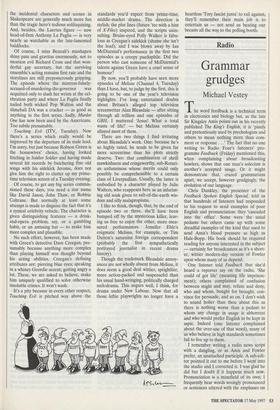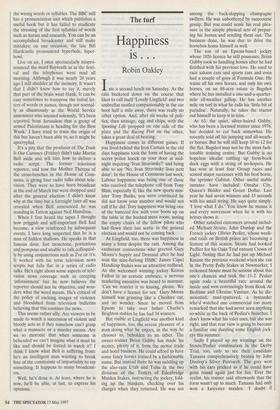Radio
Grammar grudges
Michael Vestey
The word feedback is a technical term in electronics and biology but, as the late Sir Kingsley Amis points out in his recently published The King's English, it is `pissily and pretentiously used by psychologists and others to mean nothing more than com- ment or response . . .' The fact that no one writing to Radio Four's listeners' pro- gramme Feedback (Friday) mentioned this, when complaining about broadcasting howlers, shows that one man's solecism is another's accepted usage. Or it might demonstrate that, crazed grammarians apart, we accept, however grudgingly, the evolution of our language.
Chris Dunkley, the presenter of the Feedback Spoken English Special, told us that hundreds of listeners had responded to his request to send examples of poor English and pronunciation: they 'cascaded into the office'. Some were the usual pedants but others came up with some dreadful examples of the kind that used to send Amis's blood pressure as high as Hale-Bopp. His book should be required reading for anyone interested in the subject — certainly for broadcasters as it's a short- er, wittier modern-day version of Fowler upon whom many of us depend.
One listener told Feedback that she'd heard a reporter say on the radio, 'She could of got life' (meaning life imprison- ment); others complained of confusion between might and may, refute and deny, who and whom, bought for brought, con- vince for persuade, and so on. I don't wish to sound holier than thou about this as there is nothing worse than a pedant to whom any change in usage is abhorrent and who would prefer English to be kept in aspic. Indeed (one listener complained about the over-use of that word), many of us who believe in high standards sometimes fail to live up to them.
I remember writing a radio news script with a dangling, or as Amis and Fowler prefer, an unattached participle. A sub-edi- tor pointed it out to me before I went into the studio and I corrected it. I was glad he did but I doubt if it happens much now. Pronunciation is a minefield of its own; I frequently hear words wrongly pronounced or sentences uttered with the emphases on the wrong words or syllables. The BBC still has a pronunciation unit which publishes a useful book but it has failed to eradicate the stressing of the first syllables of words such as harass and research. You can be an accomplished broadcaster and still make mistakes; on one occasion, the late Bill Hardcastle pronounced hyperbole, hiper- bowl.
Live on air, I once spectacularly mispro- nounced the word Bayreuth as in the festi- val and the telephones went mad all morning. Although it was nearly 20 years ago I still shudder at the memory. It wasn't that I didn't know how to say it, merely that part of the brain went blank. It can be easy sometimes to transpose the initial let- ters of words or names, though not normal- ly as disastrously as the World Service announcer who intoned solemnly, 'It's been reported from Jerusalem that a group of armed Palestinians is heading for the Best Wank.' I have tried to trace the origin of this but haven't been able to, so it might be apocryphal.
It's a pity that the producer of The Truth Is Our Currency (Friday) didn't take Martin Bell aside and tell him how to deliver a radio script. The former television reporter, and now the Mother Theresa of the cross-benches in the House of Com- mons, is giving four radio talks about tele- vision. They were to have been broadcast at the end of March but were dropped until after the general election. I didn't know why at the time but a fortnight later all was revealed when Bell announced he was standing in Tatton against Neil Hamilton.
When I first heard the tapes I thought how priggish and self-important Bell had become, a view reinforced by subsequent events. I have long suspected that he is a man of hidden shallows. He speaks in that famous dour, fast monotone, portentous and pompous and unable to talk colloquial- ly by using conjunctions such as I've or it's. It worked with his terse television news scripts but falls flat in a series of radio talks. He's right about some aspects of tele- vision news coverage such as creeping `infotainment' but he now believes the reporter should not be objective, and won- ders what the word means. He's critical of the policy of excising images of violence and bloodshed from television bulletins believing that this sanitises the news.
This seems rather silly. Are viewers to be made to watch a succession of violent and bloody acts as if they somehow can't grasp what a massacre or a murder means. Are we so moronic that when someone is beheaded we can't imagine what it must be like and should be forced to watch it? I think I know what Bell is suffering from: he's an intelligent man wanting to break free of the constraints of impartiality to say something. It happens to many broadcast- ers.
Well, he's done it. At least, where he is now, he'll be able, at last, to express his opinions.



































































 Previous page
Previous page